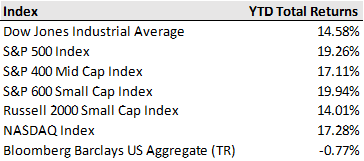U.S. equities slid lower for the second consecutive week following mixed U.S. economic data reports and the ongoing Congressional stand-off regarding the debt ceiling and stimulus negotiations. Global concerns have also weighed on sentiment as investors gauge the ripple effects out of China of the potential failure of a large, highly indebted property developer, China Evergrande Group, in addition to the escalating regulatory crackdown on a range of industries. For the week, the S&P 500 fell -0.6% while the Dow Jones and Nasdaq Composite lost -0.5% and -0.9%, respectively, and the selling pressure is continuing into this week’s early trading with growing focus on Evergrande and its fallout. Despite the volatility, the S&P 500 remains within 5% of its all-time high.
After years of runaway growth in real estate construction, mounting leverage, and rising property prices in China, Chinese officials are seeking to reign in the overbuilding in the sector and force real estate developers, like Evergrande, to reduce their debts. The aim of the deleveraging campaign is to prevent a growing systemic risk and redirect capital investment to more productive avenues that are in line with the state vision, like semiconductor manufacturing. Market participants increasingly anticipate that Beijing will allow the failure of Evergrande, which looks unlikely to be able to cover its bond interest payments due this week, leaving its stock and bondholders and business counterparties with large potential losses. Evergrande carries the largest debt burden of any publicly traded real estate management or development company in the world, according to Wall Street Journal, with over $300 billion in liabilities.
As a result of the uncertainty from Evergrande, global equity markets are volatile so far this week as investors assess the broader implications. While there remains a lack of clarity around the response from Chinese officials to a potential default of this scale, we don’t foresee this event snowballing into a broader global financial market crisis at this point in time. Global financial markets remain flush with cash from the pandemic policy response of central banks around the world and the playbooks for dealing with liquidity stress remain at the ready. It may also lay the groundwork for more fiscal stimulus and monetary accommodation within China to help absorb and contain the shock.
However, there is potential for this episode to further put the brakes on near-term economic growth in China, which was already showing signs of decelerating, as real estate sector activity slows. Slowing construction activity in China’s resource-hungry economy could have knock-on effects for commodities, like steel, as well as global industrial and material companies with exposure to China.
In the week ahead, U.S. policy makers will also be in the spotlight. The Federal Reserve is set for an important monthly meeting, which could provide further insight on the timeline to begin rolling back accommodative monetary policy. The Fed is not expected to make a formal tapering announcement until November with the process of slowing bond purchases beginning in December. The potential for rate hikes remains further down the road with consensus expectation to begin in 2023 but this meeting will provide an update on the Fed board’s expectations on timing and pace.
Congress is in for a busy week as well with the immediate priorities to address a possible government shutdown after September 30 and a debt ceiling that must be raised by mid-October to avoid default. Democrats' current plan is to pair short-term funding authority through December with a debt-ceiling hike into 2022, but Republicans are not expected to support this plan and are resisting an increase to the debt limit in protest to the large spending bills being debated in Congress. The current gridlock on this issue could delay and impact the likelihood of the Democrats’ $3.5 trillion stimulus plan as well as the bipartisan, Senate-passed $1.2 trillion infrastructure bill that was set for a vote on September 27th.


